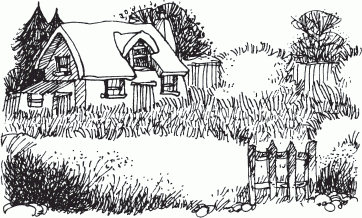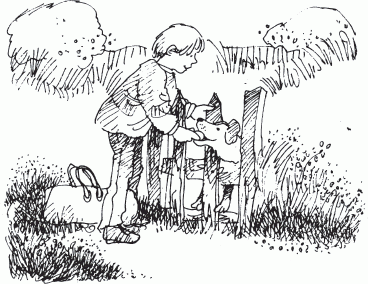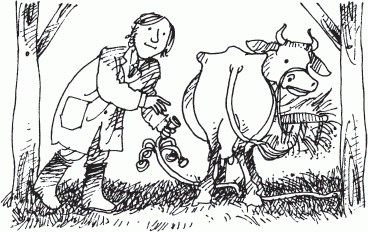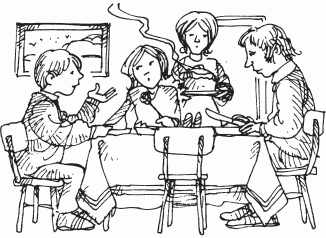
It was half past three. And on that warm, sunny afternoon in early summer, the children were glad to get out of school. They ran across the playground, pushing and jostling out through the gate. Some jumped into waiting cars but most of them turned down the road that led to the village. Colin went with them, but where the road split in two he stopped and his friend Will stopped too.
“Here,” said Will, fishing in his school bag, “I’ve got something for her. My mum said I could have the leftovers.” And he pushed something wrapped in greaseproof paper into Colin’s hand.
“Thanks,” said Colin. “Coming to see her?”
“Not now. We’re going down to Gran’s for tea. Mum said I was to come straight home. Maybe I’ll come tomorrow. But, Cal, my dad said we’ve got to do something or tell someone. We can’t just keep on giving her things. What’ll happen when we go to camp?”
“That’s ages yet.”
“Yes, but —”
Colin stuffed the greaseproof paper into his bag with his school books and nodded. “I’ll tell my dad tonight,” he said. “He’ll know what to do. I wish… oh, I do wish…”
“What d’you wish?”
“That I could have her,” said Colin. “I just wish that she was mine. I’d soon fatten her up.”
Will nodded. “I might bring a sausage from Gran’s,” he said comfortingly. “She always gives us sausages! Bye, Cal, see you.” He ran off down the road. Colin crossed to the lane that led up the hillside toward his home. He was quite glad to be alone because he had a lot to think about. It was a beautiful day and late bluebells and buttercups grew along the hedge. The warm sun shone on his face and from somewhere in the oak wood a cuckoo called. Then he turned off the lane and climbed a little track that led to the common beyond. On the edge of the common was a cottage surrounded by a garden.
The garden gate was broken and the paint was cracked. Colin rested his chin on it and looked round. The garden was choked with weeds. The grass had grown as high as his knees. The windows of the cottage were dirty and tight shut. Colin gave a soft whistle.

Nothing happened.
Colin whistled quite loudly with his eye on the window.
There was a sudden rush. A black dog, half Labrador and half terrier, came streaking round the side of the house. She was barking excitedly. She put her paws on the bottom bars of the gate and pushed her nose through the gap. Her whole thin body shook with excitement. Colin pulled the greaseproof paper parcel out of his bag. He fed the dog with half a Cornish pasty and a piece of cheese. He also had some ham, broken bread and crackers from his lunchbox. He stuck his hand through the bars and stroked the thin dog. He could count every rib. The dog nosed his face, licked his cheeks and whined with pleasure.

“Don’t go,” she seemed to be saying. “Please don’t go. I need you so much.”
Colin stayed quite a long time, stroking and patting the dog. He spoke to her softly because she seemed to understand.
“I’m going to talk to my Dad about you,” said Colin. “I’m going to do something. I wish you were mine. I’d soon fatten you up and you’d be the best dog in the village. But I don’t suppose Dad would let me keep you. We’ve got Growler already on the farm. He’s our guard dog. He’s not nice and friendly like you.”
He left at last, turning back and waving at the twitching black nose poked through the bars. Then the track turned into the wood and he could no longer hear the short, sharp little barks. He felt very unhappy even though he had promised to go back tomorrow. He did not know who lived in that cottage. But he did know that someone was starving the dog. He hurried up the lane and into the farmyard at the top of the hill. He was home.
He liked living at the top of the hill. If he looked behind him, he could see the north end of the hills rising steeply behind his school. On the other side, the meadows sloped gently to the woods, hop fields and blossoming orchards of Worcestershire. It was like being on top of the world, thought Colin, as he trotted across the yard. He went straight to the milking shed. He was quite late and Dad would be busy with the cows. Colin pushed past the orderly herd that stood waiting their turn outside. He went into the big shed.
His father, in his white coat, was fastening the nozzles on the udders of the cows. The electric siphon was whining and the milk was sloshing in the tank. The cows mooed contentedly. It was quite noisy.

“Dad!” shouted Colin, standing on tiptoe. “There’s a dog and she’s very thin—”
“What’s that?” asked Dad, stooping down. “Dog? The dog’s all right, Colin. I’ve just fed him. Run in and tell Mum I’ll be along in about half an hour.”
Colin sighed. It was no good trying to talk to Dad during the milking. Perhaps Mum would help. He ran over to the house and found Mum putting a big shepherd’s pie in the oven. His sister, Joy, had just come in from her school.
“Mum,” said Colin, “there’s a poor dog and she’s very, very thin. She might be starving.”
“Then we’d best call the RSPCA. They care for animals that have been badly treated, don’t they? Who does this dog belong to, Colin?”
“I don’t know. It’s a cottage and it looks all shut up.”
“If she’s starving, the RSPCA’ll come and take her. Go and change, Colin, and then you can collect the eggs.”
About half an hour later they all sat down to their tea and Colin started again. “Dad, there’s a dog, and she’s very thin, almost starving. How do I get the RSPCA to come out to her?”

“Well, you’d best find out who she belongs to first. Where did you see her?”
“Will and I went up the common to look for nests last week. There’s a cottage at the edge of the common. It’s all untidy and shut up. Dad, the dog’s ever so thin.”
His father looked interested. “That’ll be old Charlie’s cottage,” he said. “He went to live there after his wife died. Strange old man, they say he is. Won’t let anyone into his house. But that dog was his best friend. Old Charlie would never mistreat his dog. There must be something wrong. Why didn’t you tell us before?”
“It was a sort of secret and we thought we’d feed her ourselves. Then we suddenly thought, maybe there’s no one there and we’d best tell.”
“Perhaps old Charlie’s ill or something,” said Mum. “Someone ought to call in. Maybe we’d better call the police.”
“Well, he might not like that,” said Dad. “How about asking the vicar? Would you give him a ring Colin? Ask him to call round to old Charlie’s, to see what’s happened.”
“Tell you what, Dad, I’ll go and get him.” Colin glanced out at the sloping shadows and the bright sky. It was still quite a long time to sunset. “I won’t be long, I promise.”
And he was out of the door before his parents could stop him.